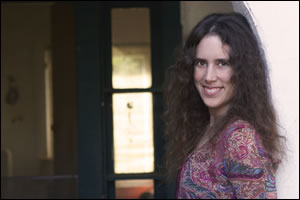Nicole Helget: The Turtle Catcher
September 15, 2010 by David
Filed under Fiction, WritersCast
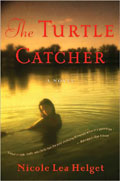 978-0547248004 – Mariner Books – paperback – $13.95 (also available as an e-book)
978-0547248004 – Mariner Books – paperback – $13.95 (also available as an e-book)
I found this book, written by an author I had never heard of before, by doing something very old fashioned: browsing in a bookstore. There are many forms of discovery, but finding a book you want to read in a store is still a great pleasure. And when you take it home and start reading it, and find out you made a lucky choice to read an exceptionally fine novel, that is a true and deeply rewarding experience.
I was surprised to learn that The Turtle Catcher is Nicole Helget’s first novel – she doesn’t write like a first novelist at all. The opening of this novel is absolutely perfect, and is beautifully written, setting the tone for a complicated, very often painful, but also engrossing story. Helget’s novel is mystical and magical, but these moments of “magical realism” where she enters another plane counterpoint brilliantly with the almost plainspoken story she has to tell about immigrant families in a German-American community in rural Minnesota in the early 20th century. The book is set in the now little discussed period just before, during and after World War I, a time that was very complicated for communities of recently arrived immigrants from the old country, with Germany now the enemy of their new homeland. The tensions within the town provide a taut backdrop for Helget’s for the focus of her story.
The author weaves together the lives of two families living on adjoining farms in the small town of New Germany, Minnesota. Liesel Richter and Lester Sutter are at the core of the book, along with their fathers and deeply suffering mothers, and what happens to Lester, told brilliantly and painfully in the opening scene of the book is the capstone to a long, rich story of families and communities, hidden wounds and deep suffering transformed into a kind of stoic transcendence Helget’s characters embrace, almost because it is all they are capable of doing in the face of such pain.
In The Turtle Catcher, Nicole Helget has created a multi-layered family story whose characters inhabit (and illustrate for readers) a specific place and time, but as with all great novels, through their story, they are transformed into something deeply moving and powerful. I really loved this novel, and will read it again, I am sure.
I wanted to talk to Nicole about the emotional content of the book, how she came to create this novel (it started with a short story), and discuss some of the complexities of her really wonderfully drawn characters. I think we succeeded in exploring this writer’s work in a really interesting conversation I hope will encourage readers to seek this novel out and read it for themselves. I do think Nicole Helget is a terrific writer, someone whose work I am deeply gratified to have discovered.
Podcast: Play in new window | Download
Avery Aames: The Long Quiche Goodbye
September 5, 2010 by David
Filed under Fiction, WritersCast
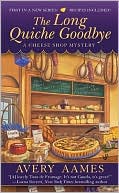 978-0425235522 – Berkley – Mass Market Paperback Original – $7.99 (also available as an ebook 978-1101188644 at $6.99)
978-0425235522 – Berkley – Mass Market Paperback Original – $7.99 (also available as an ebook 978-1101188644 at $6.99)
I don’t often read mysteries, but a few weeks ago, right in the middle of summer, the season for entertaining novels (often known as “beach reads”) I decided to give this novel a try. The tongue-in-cheek title first caught my attention, and I really liked the unusual setting for the novel (small town Ohio) and the quirky but very believable cast of characters. So The Long Quiche Goodbye is definitely a fun read but not just a throwaway summer book. Avery Aames is a good writer and she has deft with her creation and handling of characters.
As I mentioned, I am not a steady reader of mysteries, so I may not be as experienced as some are with the various forms and formats of mysteries – they do fall into a set of recognizable patterns, I know. In The Long Quiche Goodbye, our main character is Charlotte Bessette, the proprietor of the family owned cheese shop called Fromagerie Bessette, in the small town of Providence, Ohio. At the gala re-opening of the store after a full scale renovation and modernization, the store’s landlord (whom we already know not to like) is found stabbed to death with one of the store’s knives, and Charlotte’s grandmother is the prime suspect.
We’re off from there, with a full cast of local characters, friends, family, police, and a couple of other prime suspects in town to make things interesting. And it’s Charlotte who takes the lead in finding out who the real killer must be, as clearly, she feels (and we come to feel as well) that it could not have been her wonderful grandmother (who is the Mayor of the town!)
Avery Aames had a lot of fun writing The Long Quiche Goodbye, I think, and her pleasure and involvement with her characters comes across in the way she writes their story. I also had a great time talking to her about this well written book, her work as a writer, and the next books in the series that this book inaugurates. It looks like this series will be successful, and deservedly so – this first in the “Cheese Shop Mysteries” is already a national bestselling mystery novel. You can visit Avery’s website to learn more.
Podcast: Play in new window | Download
Gayle Brandeis reading from “Delta Girls”
August 15, 2010 by David
Filed under AuthorsVoices
978-0345492623 – Ballantine – Paperback – $15.00 (also available as an e-book at $9.99)
Writerscast is proud to present the third in a series of authors reading from their work, called AuthorsVoices. I hope you will agree that hearing these works read aloud by the original authors adds to your experience of the writing.
I love getting a sense of the author’s distinct sense of her or his own words. With writers touring in support of their books less frequently now, these podcasts should provide readers with an opportunity to hear some of our best contemporary authors reading from, and sometimes performing their own works.
Gayle Brandeis’ Delta Girls was a great discovery for me. I loved her writing, her characters, and the pace and flow of the novel. I particularly enjoyed the way Gayle set up the alternating stories of the two women, Izzy and Karen and of course brought them together with what was for me a very surprising climax to the story. In this reading from the novel, Gayle reads the opening two chapters, where the two characters are introduced and their ultimately intertwining stories begin.
Gayle has a terrific website where you can learn more about her and her work. Her’s her brief bio as a writer:
Gayle Brandeis grew up in the Chicago area and has been writing poems and stories since she was four years old. She is the author of Fruitflesh: Seeds of Inspiration for Women Who Write (HarperOne), Dictionary Poems (Pudding House Publications), the novels The Book of Dead Birds (HarperCollins), which won Barbara Kingsolver’s Bellwether Prize for Fiction in Support of a Literature of Social Change, Self Storage (Ballantine) and Delta Girls (Ballantine), and her first novel for young readers, My Life with the Lincolns (Holt). It’s great hearing her own voice here speaking the words she has written.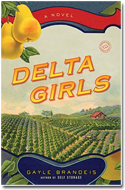
Podcast: Play in new window | Download
Gayle Brandeis: Delta Girls
August 10, 2010 by David
Filed under Fiction, WritersCast
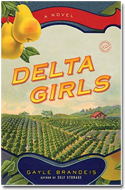 978-0345492623 – Ballantine – Paperback – $15.00 (also available as an e-book at $9.99)
978-0345492623 – Ballantine – Paperback – $15.00 (also available as an e-book at $9.99)
I think I have been lucky lately – I keep finding new novelists I have never heard of before, whose work turns out to be really good. Literary discovery is very exciting. Gayle Brandeis is one of those novelists whose work is completely new to me. Delta Girls is her third novel for adults, and she has one other for young adults. Her social awareness as a writer has been recognized for a previous novel (that I now want to read) called The Book of Dead Birds – it won Barbara Kingsolver’s Bellwether Prize for Fiction in Support of a Literature of Social Change, which I consider high praise indeed. One of Gayle’s great accomplishments in Delta Girls is to include a strong undercurrent of social awareness in a way that enhances the story and does not in any way intrude on one’s enjoyment of the novel and its characters.
Delta Girls is a terrific novel (great cover too, and yes, I do think the overall book package does contribute to the experience for the reader). Its construct is unusual – each chapter is the alternating story of two characters whose relationship is not divulged until nearly the end of the book. First is Izzy, who with her nine year old daughter Quinn, is constantly on the move as an itinerant fruit picker in California. As the story opens, they arrive at a pear orchard in the Sacramento River Delta. As with all her stops, Izzy has no intention of staying very long. But the orchard, its locale, and the family that owns it has a strong attraction for both Izzy and Quinn, and they both allow themselves to become involved and attached to the orchard and its people. We know that Izzy has a secret in her past, and that she has worked hard to stay away from the public eye, but events occur that put her in the middle of developments in the Delta and she will have to risk everything to save the ones she loves.
In the alternating narrative of the book, we meet Karen, a rising young star in figure skating with a pushy mother and a powerful and attractive new skating partner. Nathan is sexy, dangerous, and deeply attractive to Karen. As she reaches her 18th birthday, events come to a head in an unexpected and very public way.
Each main character is faced with a sudden thrust into the spotlight, and of course their narratives become more connected — but you will need to read the book to find out the surprising way their lives will intersect.
This is a very satisfying novel to read, with great characters, and of course the pear orchard and the Delta of the Sacramento River is a terrific backdrop for the book. The author’s deep love for her characters as well as her understanding of the power of place, and its influence on people’s lives show constantly throughout the novel.
Gayle is a thoughtful and accomplished writer whose work I am really pleased to have discovered. It is writing I want to explore more deeply. Talking to her about this book was a pleasure I am happy to share here. You can visit Gayle’s website here to learn more about her work.
Podcast: Play in new window | Download
Tatjana Soli: The Lotus Eaters: A Novel
June 4, 2010 by David
Filed under Fiction, WritersCast
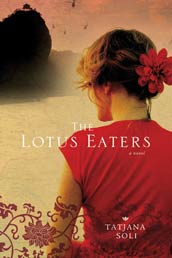 978-0312611576 – St. Martin’s Press – Hardcover – $24.99 (also available as an e-book)
978-0312611576 – St. Martin’s Press – Hardcover – $24.99 (also available as an e-book)
I know I am not alone having read both Tatjana Soli’s The Lotus Eaters and Karl Marlantes’ Matterhorn – they are unavoidably linked as both are set in Vietnam during the American war. Of course they are incredibly different in outlook, approach and story, but reading them together is a wonderful experience. As Writerscast listeners know, I loved Matterhorn – I do think it is the great novel of the Vietnam War that we have been waiting to experience for several decades.
At the same time, Tatjana’s novel is simply remarkable. She writes beautifully, inhabits her characters, their place and time, their suffering, challenges and transcendent moments. As she told me in her interview, she fell in love with the Vietnam of that era from afar, and learned everything she could about it in order to be able to write this story. Her main character is a young photographer, Helen, who comes to Vietnam early in the war, mainly because her brother died there, and she is drawn to the place where he lost his life, to figuratively solve the mystery of his death. But that is just the beginning of her journey. The war, the soldiers and other journalists, and the people of Vietnam overtake her. She becomes deeply connected to this place and time. Soli brilliantly portrays the landscape and the people of Vietnam, the suffering and horror of a seemingly endless war, and the way that war overtakes every element of human and natural life.
Helen falls in love with another photographer, Sam Darrow, a grizzled veteran who teaches her how to cope with war, survive, thrive, document, participate, suffer and love the danger and energy of men at war. But the truest, and deepest story is her love for Linh, an exceptionally complicated Vietnamese former soldier, who has gone to work for the American news agency Helen works for. At the end of the book, which thankfully avoids the cliched approach of much modern fiction, Helen and Linh journey out of Vietnam through Cambodia, an even more horrendous landscape of death and together find their way to safety, a harrowing journey that mirrors where they have traveled emotionally through the course of the novel.
A woman among men sees war more clearly than most, I think; in this book, that vision focuses and transforms the reader as well. Tatjana Soli’s story about writing this book and what it means to her is great to hear. I think she is a terrific writer, worth reading, and well worth listening to as well.
Podcast: Play in new window | Download
Joanna Smith Rakoff: A Fortunate Age
April 22, 2010 by David
Filed under Fiction, WritersCast
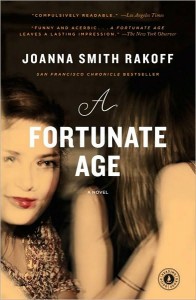 978-1416590804 – Paperback – Scribner – $15.00
978-1416590804 – Paperback – Scribner – $15.00
Joanna Smith Rakoff is a wonderful writer – she’s a poet and an essayist, and her skill as a writer shines throughout her novel A Fortunate Age. This was not a book I expected to enjoy as much as I did; Rakoff won me over with the details of her sprawling story, and her characters, whom I similarly did not expect to like so much. The book is modeled directly on Mary McCarthy’s now classic, The Group, whose characters were Vassar women, in a story set in the 1930s and 1940s, whereas Rakoff’s characters are all friends from Oberlin, living in New York City in the late 1990s and the early years of the new century.
Like the novel Rakoff used for inspiration, this is a complicated story with a number of characters told over a number of years. This novel is set mostly in New York City with flashbacks to her characters’ earlier lives, especially their time in college in Oberlin, and some side stories as well. Essentially, it’s a coming of age story, and based on the supposition, I think, that for so many of us, the decade crossing from our twenties to our early thirties truly marks the painful bridge from still youthful adulthood to “real” life. It’s not an easy transition, and for many has the sense of hyper-focused reality that makes it all the more powerful for those experiencing it.
In talking with Joanna, I wanted to explore her interest in Mary McCarthy and her novel that A Fortunate Age is based on (and The Group is also a book I recommend to modern readers, it is a book that is probably more neglected than it should be). Joanna talks about the striking similarities she felt between the lives of her own age group and that of McCarthy’s and how that led her to write her own book. We also talked about the way her book is imagined and how through fiction she worked to represent a particular time and place, a milieu that she evokes through this story, the breadth of her characters and their individual linked stories. As she points out, this novel is, for her almost Victorian in the way its characters function against and within an overall cultural structure toward understanding their social being. There is alot going on in her book, which Rakoff manages quite masterfully, and her ability to handle complexity of story and persona shines in this interview as well. I’m certainly looking forward to reading her next book and to talking to her again.
Podcast: Play in new window | Download
E.M. Broner: The Red Squad
March 28, 2010 by David
Filed under Fiction, WritersCast
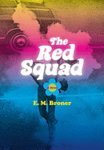 978-0307-37791-3 – Hardcover – Pantheon – $24.00 (also available as an e-book; a paperback edition will be out in July 2010 – 978-0307-45584-0 – $15.00)
978-0307-37791-3 – Hardcover – Pantheon – $24.00 (also available as an e-book; a paperback edition will be out in July 2010 – 978-0307-45584-0 – $15.00)
This is a sometimes hilarious, always engaging, warm and sexy novel about a group of midwestern academics from the sixties, told from the vantage point of Anka Pappas, who, forty years after this fraught period in her life, finds out the entire group was under surveillance by the federal, state and local governments. The story weaves together past and present, as Anka reconnects with her friends and associates – much drama, emotion, and memory unfolds, demonstrating that the past is not at all a dead or forgotten issue. It’s a complicated story that Ms. Broner tells quite skillfully, keeping alot of balls in the air (it does help to have a cast of characters in the front of the book to which the reader can refer, as there is alot of perspective changing going on, sometimes at very high speed).
Broner knows that the political engagement of the sixties and early seventies can not be seen as an isolated period. It is deeply connected to our present. And through this book, she shows us that the issues that engaged the young activists of that earlier period are still with us today. The power relationships in our society ultimately have not been changed; there is much work to be done, and much more engaged life to be lived.
There’s no preaching here, this is a book written by a smart, accomplished writer, who knows how to make a story work, and who clearly had a great time writing this book. Talking to Esther Broner about the book was alot of fun for me. In this interview, she talks about this book and how it relates to her own life. We talk about politics, the nature of fiction and nonfiction, memoir and story, reality and imagination, appearance and reality, and of course the connection between the activism of the 1960’s and how it relates to us today.
This is an enjoyable, funny book that carries a powerful political and emotional punch, written by a skilled and experienced author whose work deserves a wide audience.
Podcast: Play in new window | Download
Dolen Perkins-Valdez: Wench
March 4, 2010 by David
Filed under Fiction, WritersCast
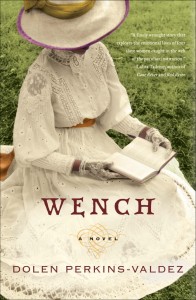 978-0061706547 – Hardcover – Amistad/HarperCollins – $24.99
978-0061706547 – Hardcover – Amistad/HarperCollins – $24.99
Dolen Perkins-Valdez’ first novel, Wench, just blew me away. The writing is beautiful, and the story is compelling. Perkins-Valdez has been able to imagine her characters in a very difficult time, in very difficult circumstances, capturing their pain and suffering as well as their joys, and the complexity of life lived by humans. No stick figures here, male or female, black or white. The author is sympathetic in the strongest sense of that word – she understands people. She does not excuse anything, but she is able to imagine who they are, and therefore her readers are given no excuses either. Here’s the story of the book (I took this from the author’s own website, which is one of the better author websites I have seen recently):
In 1851, a lawyer named Elias P. Drake purchased a plot of land near Xenia, Ohio with the intent to establish a summer vacation resort where the country’s elite could relax and enjoy the mineral springs in the area. At the time, it was believed that natural water could cure illnesses and bring about good health. What made this resort unusual, however, was that it became a popular vacation destination for southern slaveholders and their enslaved mistresses. Ultimately, these flagrantly open relationships offended the northern abolitionists who also frequented the resort. After four years, the resort closed.
This part of the story has been confirmed by historians. I took this forgotten historical note and sketched in a fictional account of what it would have been like to be an enslaved woman traveling to this free state each summer. Why wouldn’t the women try to escape? What kinds of emotional attachments did they have with these men? Initially, I believed that it was entirely possible that they actually loved the men. Ultimately, I discovered that it was much more complicated than that.
Situated in the free state of Ohio, Tawawa House offers respite from the summer heat. A beautiful, inviting house surrounded by a dozen private cottages, the resort is favored by wealthy Southern white men who vacation there, accompanied by their enslaved mistresses.
Regular visitors Lizzie, Reenie, and Sweet have forged an enduring friendship. They look forward to their annual reunion and the opportunity it affords them to talk over the changes in their lives and their respective plantations. The subject of freedom is never spoken aloud until the red-maned, spirited Mawu arrives and voices her determination to escape. To run is to leave behind the friends and families trapped at home. For some, it also means tearing the strong emotional and psychological ties that bind them to their masters.
When a fire on the resort sets off a string of tragedies, Lizzie, Reenie, and Sweet soon learn tragic lessons,that triumph and dehumanization are inseparable and that love exists even in the cruelest circumstances as they bear witness to the end of an era.
That’s the bare bones of the story. Obviously, you need to read this book to understand how good it is. And do listen to this interview. In it, Dolen talks about how she became a writer, how this book came about, how she feels about her characters, and a great deal more. Dolen Perkins-Valdez is a writer who deserves our attention. I’m very much looking forward to her next book, and hoping she will be writing many more after that.
As an aside, the cover is beautiful, and perfect for this book, and has a sort of subliminal effect on me, which maybe contributed subtly to how much I liked reading this book and talking to its author.
Podcast: Play in new window | Download
Jennifer Estep: Spider’s Bite
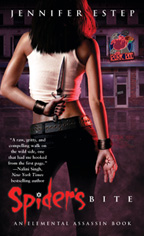 978-1439147979 – Mass Market Paperback – Pocket Books – $7.99
978-1439147979 – Mass Market Paperback – Pocket Books – $7.99
Jennifer Estep has written three books before this one, in an edgy paranormal romance series she called Bigtime. Spider’s Bite kicks off a new series, this one she calls urban fantasy, and I think the description is apt. It’s gritty, violent, tough, but full of love and a kind of self-defined punk-inspired love that has a depth and strength that is really admirable.
I know the book business likes to categorize books, sometimes quite narrowly, and there are good reasons for that. So this book falls into a category that Publishers Weekly calls “urban fantasy.” While I am not quite sure I know what that means, this novel is certainly a full on fantasy novel set in a city, so I guess that label fits in a literal way. But all labels and categories aside, author Estep has fashioned a terrific set of characters, in particular our hero, Gin. The first line of the book makes clear what we readers are getting into: “My name is Gin, and I kill people.” And she does, she is an assassin after all.
I was very impressed with Estep’s writing and she has fashioned a terrific story line. Some of the characters run to type, but they fit the story so well, we don’t mind. The author has set her imagination loose on the southeastern city in which the story takes place, maybe in our future, or maybe in an alternate universe, it’s wild and never dull. I’m looking forward to reading the sequels too.
Jennifer and I had a fun interview talking about this book, how she started as a writer and where her ideas come from. She’s a dedicated reader turned writer, and her love for books, ideas and writing shines through her work and her words.
See an excerpt from the book at chptr1.com. Visit Jennifer’s well put together site to learn more about her and her books.
Podcast: Play in new window | Download
Caroline Leavitt: Girls in Trouble
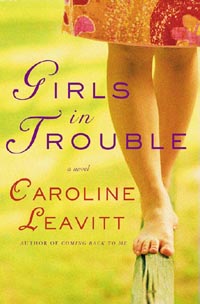 978-0312339739 – paperback – St. Martin’s Griffin – $14.95
978-0312339739 – paperback – St. Martin’s Griffin – $14.95
Sometimes you get lucky. There are books you find by accident, maybe you choose them just to browse, not meaning to become engaged, they’re discoveries, books you would not “normally” have picked up to read, they surprise you, you’re hooked, and then you can’t stop reading. For me, reading Caroline Leavitt’s Girls in Trouble was just that sort of a book. In this case I read it because she wrote me an email and asked if she could send me a copy of the book, which was easy enough for me to agree to. When it came, I picked it up, the story line described on the cover has some personal resonance, so I took a chance and started reading. And then found I could not put it down. Reading Girls in Trouble was a constant surprise and revelation. It took me places I did not expect to go, it gave me characters I wanted to know and know better, and I believed in their experiences. And it’s a big plus that Caroline can really write.
I don’t want to give any of the story away, but suffice to say, what happens to the people in this book is not what you expect, and reading it will help you understand something important about families, relationships, and parenting. Not the easy, feel-good poster stuff from the movies either. I recommend this book to almost any kind of reader, male or female, old or young, literature readers and even those who just like to be entertained. It’s that good.
Given how much I liked this book, interviewing Caroline Leavitt was quite a pleasure. She has a lot to say about writing, and the way she interacts and lives with her characters, and how this and her other books came into being. Girls in Trouble is a rich vein to mine for an interview too, as it works on so many different levels and across so many lives and years, and of course because it is centered around an open adoption gone terribly wrong, it generates a certain amount of controversy and that gives the author another great subject to talk about. I am very much looking forward to reading her next novel, Pictures of You (which we also talked about in this interview).
Podcast: Play in new window | Download

